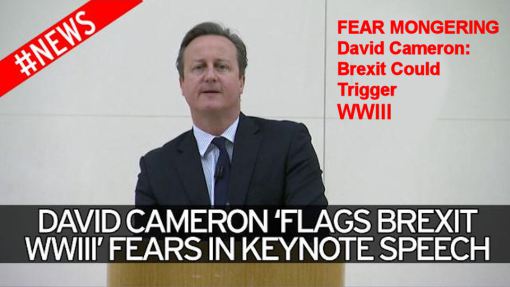Full-Blown Fearmongering: Bank Of England Warns Of Recession, “Sharp” Sterling Fall If UK Leaves Europe
ZeroHedge.com
While the Bank of England voted unanimously 9-0 to keep rates on hold at 0.5%, what the market was far more focused on the BOE’s latest gloomy scenarios about what would happen should the UK vote for Brexit on June 23. The BOE did not disappoint, and cautioned that that sterling could fall “sharply” and unemployment would probably rise, while in the press conference after the announcement BOE governor and former Goldmanite Mark Carney went all the way warning Brexit “could possibly lead to recession.”
That this takes place just days after UK’s David Cameron warned of a World War threat should the UK leave the EU is not surprising: after all the whole point is to scare the UK population into submission and into a vote to stay in the EU.
Among the warnings from the BOE’s fire and brimstone forecast was that the “Sterling is also likely to depreciate further, perhaps sharply. This combination of influences … could lead to a materially lower path for growth and notably higher path for inflation.”
Which is ironic: in a world in which every central bank is scrambling to crush its own currency, shouldn’t the BOE then welcome any event that will send the sterling “sharply” lower? Questions, questions…
Meanwhile, the torrent of doom and gloom “if Brexit happens” continues. As Reuters puts it, “British voters have faced a raft of reports from the government and international bodies in recent weeks warning of the dangers of leaving, and the International Monetary Fund is expected to weigh in again on Friday.” All of them have been uniformly bearish which likely means that the outcome from a Brexit would be quite favorable.
Earlier this week, Britain’s National Institute for Economic and Social Research (NIESR) — whose former director Martin Weale sits on the BoE’s rate-setting Monetary Policy Committee said sterling could slide 20 percent if Britain left the EU.
BoE Governor Mark Carney has previously called Brexit the biggest domestic risk to British financial stability, and on Thursday he said it could damage the global economy too.
Finance minister George Osborne, who has tried to focus voters on the economic costs of Brexit, said in a letter to Carney on Thursday that the BoE’s latest forecasts highlighted the potential “lose-lose” situation facing British households.
Many do not believe these “forecasts” – supporters of Brexit argue Britain would benefit from less European regulation, and could strike better overseas trade deals on its own. Regardless, the BOE did not relent and the central bank said that there were growing signs that the Brexit vote was weighing on the economy, but that it would fully recover from the damage if it voted to stay in the EU.
However, even without a Brexit the UK economy appears to be getting worse and as a result the it downgraded its forecasts for growth overall due to weaker productivity and higher household saving due to jitters about the general economic situation, rather than global weakness or a lasting effect from the EU referendum.
The BoE’s main forecasts worked on the assumption that the country would vote to stay in the EU, and the only concession made to the referendum was to assume that around half the slide in sterling over the past six months was temporary.
The BoE forecast Britain’s economy would grow 2.0 percent this year and 2.3 percent in 2017, down from forecasts of 2.2 percent and 2.4 percent in February.
The BOE also forecast that in two years’ time inflation is forecast to reach a fraction over its 2% target, essentially unchanged from the forecast in February. Since then, financial markets have pushed back their assumption on when interest rates will rise to early 2019 from late 2017 — in part because they price in a risk of Britain leaving the EU. Most economists still expect the central bank to raise interest rates early next year if Britain stays in. And then this surprise:
- CARNEY SAYS BANK OF ENGLAND CAN LOWER INTEREST RATE IF NEEDED
And to think just a year ago prevailing consensus was expecting the BOE’s next rate move to be higher.
Finally, on the all important topic of what the people think about Brexit, here is the latest summary poll from Bloomberg, which shows the two camps effectively tied just over a month before the all important vote.

